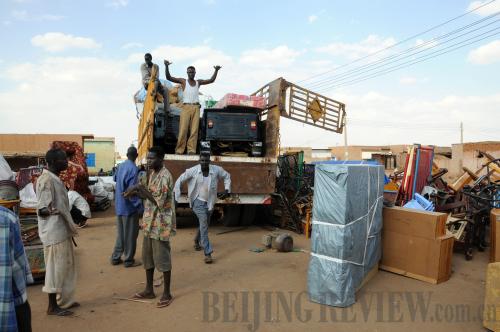|
Tough tasks
 |
|
HOMEWARD BOUND: People from south Sudan living on the outskirts of Khartoum make the move back home on October 26, 2010, in order to vote in the January 9 referendum on south Sudan's secession (XINHUA) |
South Sudan is preparing to establish itself as an independent country. However, the separation will not solve all its inherent problems. After independence, south Sudan will face a series of challenges.
The first challenge will be how to handle relations with the north. Though the north and the south have major social, economic and cultural differences, their strong link and dependence will not be severed by a referendum.
Issues ranging from border demarcation and determination of citizenship to the sharing of oil revenue and Nile River water resources call for negotiation between the two sides during the transition period.
South Sudan's oil output accounts for 70 percent of the country's total. And 98 percent of south Sudan's government revenue comes from oil. But oil export pipelines and major oil refineries are in the north. Therefore, oil will become a bone of contention. But it may also provide an opportunity for continuous cooperation, which should lead to mutual benefits.
Economic development is another tough task for south Sudan. This issue will determine whether it can stand firmly as an independent nation after separation. South Sudan has very little industry, miserable infrastructure and a poor transportation system. Despite its vast land and abundant water resources, south Sudan faces severe food shortages. Also, its educational system is skeletal, with poor facilities and a high illiteracy rate. It wouldn't be surprising if, after separation, south Sudan became the poorest country on the African continent.
South Sudan has many political parties, the most powerful of which is the Sudan People's Liberation Movement. Others include the Sudan People's Liberation Movement—Democratic Change, the United Democratic Front and the Sudan African National Union. During the civil wars and the separation process, all of them united in struggles against the north. But it remains to be seen if they can keep in step with each other while competing for their own interests after separation.
Ethnic and religious conflicts will also be a big challenge. Sudan is a multi-ethnic and multi-religious country, with 19 major ethnic groups and nearly 600 tribes. Of the Sudanese people, 70 percent are Muslims and 5 percent are Christians, while 25 percent are followers of animist and indigenous beliefs.
Most of the tribal people in south Sudan believe in indigenous religions. Although Christians account for less than one fifth of the total population in south Sudan, they dominate the autonomous government and are supported by Western countries.
China and Sudan
The China-Sudan relationship is a typical example of South-South cooperation. International media outlets like to use terms like the "China path" and the "China model" when talking about China's rapid economic development. In fact, in the field of international relations, China has also established a model. It is a kind of partnership featuring mutual respect and mutual benefits.
Though it has become the world's second biggest economy, China remains a developing country. This means China's cooperation with countries in the Middle East and Africa should be mutually beneficial, and should not always be a relationship between aid provider and aid recipient. China's technological prowess and competitive prices can make it one of these countries' major trade partners.
It should be pointed out China never attaches political strings to its cooperation with other countries, and it never interferes in their internal affairs. This is China's most fundamental difference to Western powers.
Developing countries in Africa, having gained independence from long-term colonial rule, surely need development partners, rather than "new masters." China is naturally a good choice as a partner. We have reason to believe China will maintain friendly and cooperative relationships with both north Sudan and south Sudan.
The author is a research fellow with the Institute of West Asian and African Studies at the Chinese Academy of Social Sciences | 